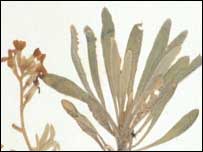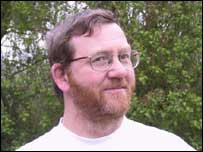 Not for Charles Darwin the time-honoured student life - drinking, parties and just enough work to get by.
Not for Charles Darwin the time-honoured student life - drinking, parties and just enough work to get by.
Research, published in the magazine Nature, reveals that while the rest of his mates were propping up the University bar, Darwin was already dreaming up his theories on evolution (though you can learn a lot about the LACK of evolution in a student bar.)
The article is the work, in part, of Dr Mark Whitehorn, a Business Intelligence expert at University College Worcester.
It is widely believed that Darwin first became interested in variation, one of the central pillars of the theory of evolution, during his journey aboard HMS Beagle.
This latest research doesn't argue with Darwin's place as the Father of Evolution, but it does suggest that his interest in the systematic study of variation arose much earlier than was thought and was sparked by the original work carried out by his mentor at Cambridge University, Professor John Henslow.
Beagle bound
The article claims that it was Professor Henslow's botanical investigations on the nature of species that established the necessary framework for Darwin’s subsequent evolutionary thought.
This is what the research is based on
Between 1821 and 1835 Professor Henslow establishing an Herbarium composed of 10, 172 plants attached to 3, 654 herbarium sheets.
 He used a variety of specimen collectors, one of whom was the young Charles Darwin, who enrolled at Cambridge in 1827 – four years before sailing on the Beagle.
He used a variety of specimen collectors, one of whom was the young Charles Darwin, who enrolled at Cambridge in 1827 – four years before sailing on the Beagle.
It was also Professor Henslow who subsequently arranged Charles Darwin’s berth on HMS Beagle.
Ironically Professor Henslow was a devout Christian, who believed in Creationism.
Dr Mark Whitehorn
"Far more than just recommending Darwin for the Beagle, we believe Henslow launched Darwin's mind during those undergraduate days on an intellectual voyage that led from a belief in species-stability to the mutability expressed in the Origin of Species." said Dr Whitehorn.
He believes the research had already caused "a significant stir among the scientific community" and that the team had several future research projects to work upon.
The article in nature is the work of:
- Dr Mark Whitehorn, a Business Intelligence expert at UCW
- Professor David Kohn a noted Darwin scholar at Drew University in the USA
- Professor John Parker, a botanist at the University of Cambridge
How to apply acrylic tips step by step?
Tricks to know when applying for disability in virginia?
What does patronage mean?
What are some tips to have children from hitting?
Tips on how to make the three point turn?
How to turn on vizio tv without remote?
What does adult swim on tiktok mean?
How long to boil water to purify?
What is the meaning of undisputed champion in boxing?
What is rhinoplasty?
What do mindset mean?
What is carbon dioxide?
How to cook steak tips inside?
What does pursuit of happiness meaning kid cudi?
Tips on how to potty train a young child?
How to download photos from icloud?
How to make homemade applesauce?
How to brown ground beef?
What is shepherd's pie?
What does hdr mean on a camera?
How long does zoloft take to work?
How to cancel roblox premium?
What does mucho gusto mean in spanish?
What does exodus mean?
What is ex dividend date?
Tips on how to make your high school basketball team?
When do tips come out of bank account?
What are minerals in food?
Ticks and tips on how to cut and style peoples hair at a barbershop for males a females?
How to pop your ears?
What does eczema look like on babies?
What is bun/creatinine ratio?
How to fold shirts?
See also:

|
Extracts from letters addressed to Professor Henslow
Book (Privately printed)
|
Herbert Spencer first used the phrase after re
by TheSchittygrubbenHerbert Spencer first used the phrase after reading Charles Darwin's On the Origin of Species in his Principles of Biology (1864), in which he drew parallels between his own economic theories and Darwin's biological ones, writing, "This survival of the fittest, which I have here sought to express in mechanical terms, is that which Mr. Darwin has called 'natural selection', or the preservation of favoured races in the struggle for life.
Herbert Spencer is smiling
by RepentfulBritish philosopher and sociologist, Herbert Spencer was a major figure in the intellectual life of the Victorian era. He was one of the principal proponents of evolutionary theory in the mid nineteenth century, and his reputation at the time rivaled that of Charles Darwin. Spencer was initially best known for developing and applying evolutionary theory to philosophy, psychology and the study of society -- what he called his "synthetic philosophy" (see his A System of Synthetic Philosophy, 1862-93). Today, however, he is usually remembered in philosophical circles for his political thought, primarily for his defense of natural rights and for criticisms of utilitarian positivism, and his views have been invoked by 'libertarian' thinkers such as Robert Nozick
Charles Darwin and the secrets of the Galapagos Islands
— ABC Online
The Galapagos Islands are famous for their abundance of wildlife, which inspired Charles Darwin's theory of evolution. Robyn Williams retraces Darwin's footsteps and discovers that not all that much has changed off the coast of Ecuador.
Extracts from Letters addressed to Professor Henslow by C. Darwin, Esq. read at a meeting of the Cambridge Philosophical Society 16 November, 1835 / A reprint of the original pamphlet dated Cambridge, Dec. 1, 1835
Book (Caqmbridge, UK: Privately Printed)
|
|
|
[Extracts from letters addressed to Professor Henslow by C. Darwin, Esq: Read at a meeting of the Cambridge Philosophical Society on the 16th of November 1835
Book (Cambridge Philosophical Society)
|
 Not for Charles Darwin the time-honoured student life - drinking, parties and just enough work to get by.
Not for Charles Darwin the time-honoured student life - drinking, parties and just enough work to get by.
 He used a variety of specimen collectors, one of whom was the young Charles Darwin, who enrolled at Cambridge in 1827 – four years before sailing on the Beagle.
He used a variety of specimen collectors, one of whom was the young Charles Darwin, who enrolled at Cambridge in 1827 – four years before sailing on the Beagle.








